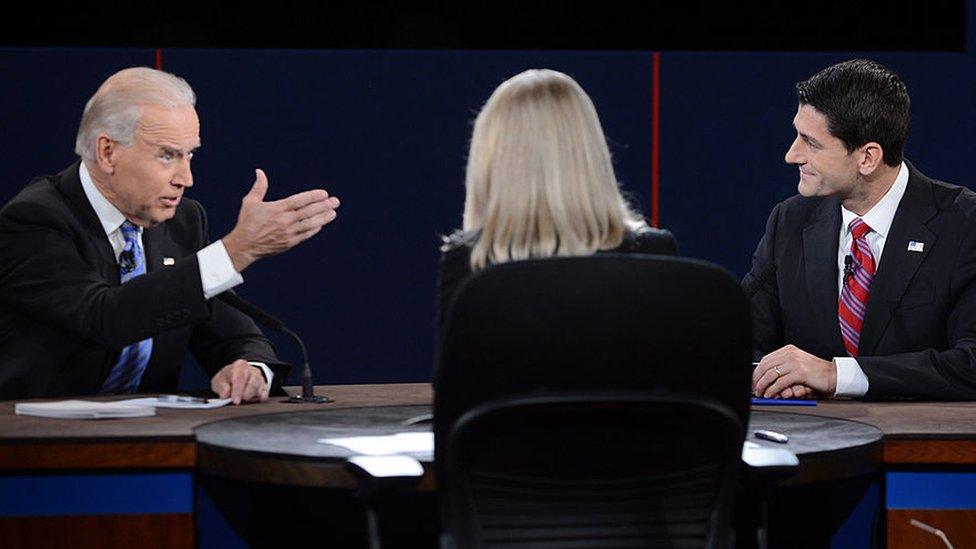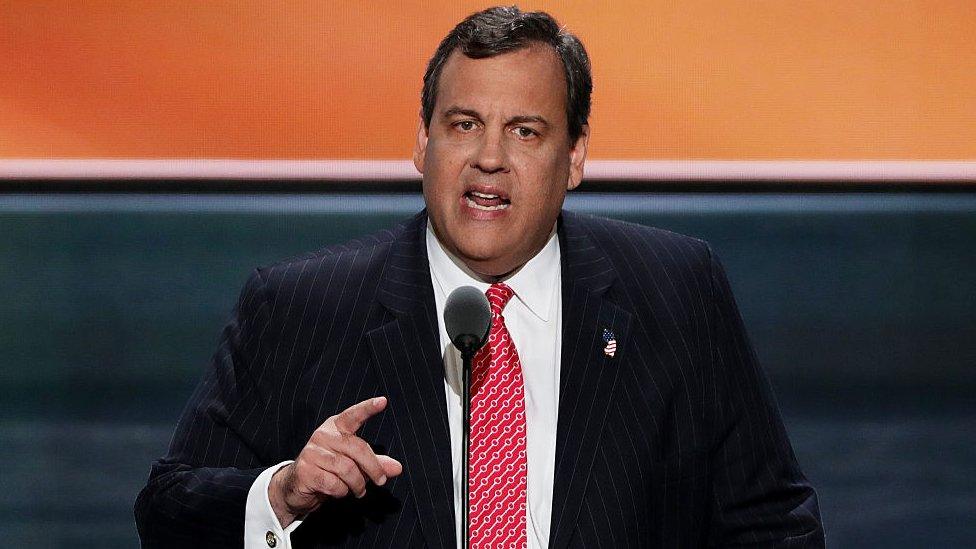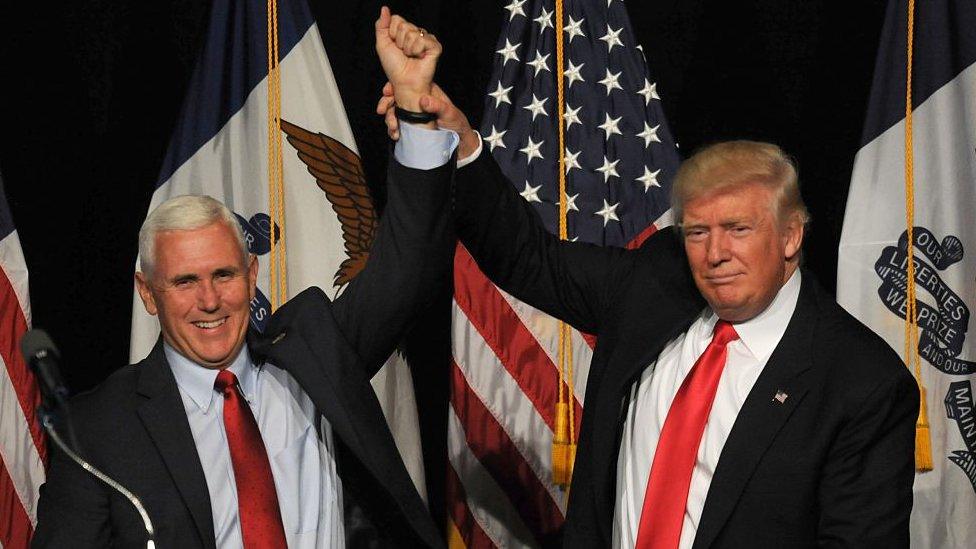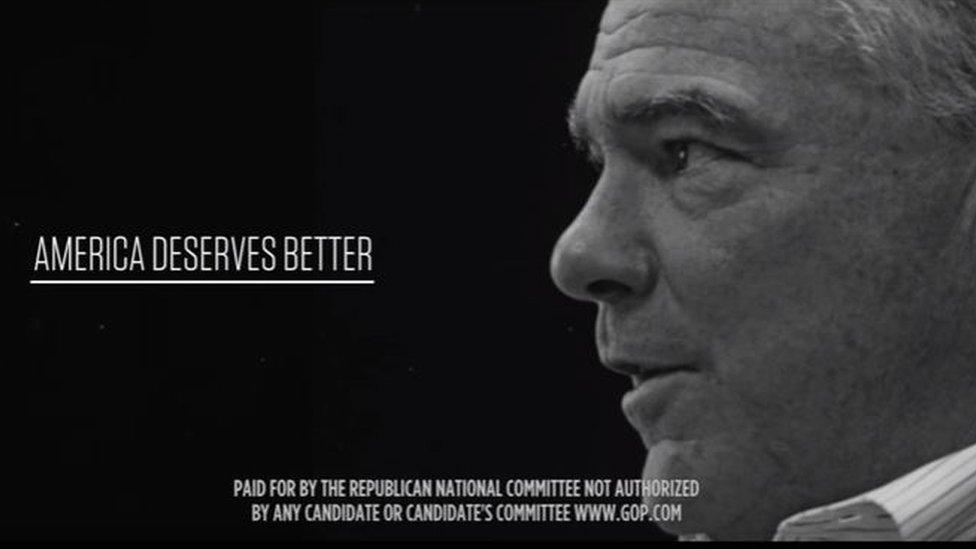Why the US vice-presidential debate matters
- Published
Vice-presidential debate: Do you know these men?
While Tuesday night's face-off between Republican Mike Pence and Democrat Tim Kaine likely won't have a lasting impact on who wins this presidential race, it should make for some interesting political theatre.
Historically, the vice-presidential debate is given scant media attention compared to the top-of-the-ticket showdowns. With one notable exception - Palin v Biden in 2008- the television audience is significantly smaller, as well. Chances are a showdown between two middle-age white men with Mid-Western roots isn't going to move the needle as far as national attention goes.
For political junkies longing for a fix before Sunday's second presidential debate, however, the event can reveal the state of the two campaigns and what could be in store as the race heads into its final weeks.
Here are four things to look for when the bottom of the ticket takes the stage in the small central Virginia town of Farmville at 21:00 EDT (02:00 BST) on Tuesday.


Joe Biden calms Democratic nerves after a shaky Obama debate performance in 2012
Steady the ship
Back in 2012, Barack Obama had a lacklustre first debate performance, putting rank-and-file Democrats into a state of near panic, as polls showed Republican Mitt Romney pulling into a dead heat.
A week later, Vice-President Biden went up against Paul Ryan and gave the kind of aggressive, animated performance that rallied his partisan troops from their doom-and-gloom stupor.
Mr Pence faces a similar situation on Tuesday night. While Hillary Clinton may not have delivered a knock-out blow to Donald Trump in New York last Monday, the Republican nominee has spent the last week punching himself in the face.
Thanks to his feud with beauty pageant winner Alicia Machado, his early morning Twitter meltdown on Friday, the New York Times article on his 1995 tax returns and renewed questions about his charitable foundation, Mr Trump is in a slump. Mr Pence's task is to be this year's Biden and calm his party's frazzled nerves.
The big question: Mr Pence needs to post a clean sheet in this debate and change the subject from Mr Trump's tumultuous week. Mr Kaine needs to keep the Clinton momentum rolling. Who can pull it off?


Mike Pence may need to take a page from the pugilistic Chris Christie if he wants to score in the vice-presidential debate
Punching up
One of the traditional roles for vice-presidential nominee is to serve as the campaign's attack dog - going after the opposition with a ferocity that would be unbecoming for the top-of-the-ticket candidate.
Of course enthusiastic aggression hasn't been a problem for Mr Trump in the past, but after his debate Monday night, some of his supporters were left wishing their man had been more direct in his criticism of his opponent.
Now's the chance for Mr Pence to go on the offensive. The problem for him, however, is he's not exactly the most adept rhetorical swordsman. While someone like New Jersey Governor Chris Christie would have joyfully tried to demolish Mrs Clinton, Mr Pence's Mid-Western reticence may make him ill-suited for the task. Where he does decide to strike could preview the areas the Trump campaign plans to focus on in the campaign's final weeks, however. Will it be on personal issues? The Clinton Foundation? Economic policy?
Mr Kaine isn't much of a bomb-thrower either. His past attacks on Mr Trump have been more along the lines of awkward-dad humour than outright belligerence. He's been given plenty of material to work with over the past week, but his challenge will be to find the best way to draw blood. Mr Trump's taxes are an obvious target that's much in the news, but rehashing his questionable behaviour toward women may prove to hold more electoral opportunity.
The big question: Which mild-mannered politician can find his inner mean streak?


Mike Pence has made a habit of coming to Mr Trump's defence
Defending your man
Google the words "Mike Pence defends, external", and the nearly half a million hits will reveal the size of the task confronting the Republican vice-presidential nominee.
He's been called on to run interference for Mr Trump on taxes, immigration, Vladimir Putin, Donald Jr's Skittles tweet ... just about every bit of controversial news coming out of his team's campaign since he joined the ticket.
Playing Donald Trump's straight man is a thankless job made all the more difficult because Mr Pence is a conventional politician expected to behave in conventional ways. While the New York real estate mogul has been singularly adept at shrugging off criticism, Mr Pence - who wants to stay electorally viable - is more constrained by political norms.
Mr Kaine will have his own challenges, although they're of the more traditional variety. He could have to explain his candidate's shifting stance on global trade deals - such as backing away from support for the Trans-Pacific Partnership - even though he has praised trade deals in the past. And he will almost certainly be pressed on Mrs Clinton's email controversy and conflict-of-interest allegations involving the Clinton Foundation.
The big question: Mr Kaine won't get off easy, but has any vice-presidential nominee faced a more extraordinary challenge than Mike Pence?


Tim Kaine's anti-death-penalty work has drawn fire from Republicans
Capital accusations
All the focus will be on Mrs Clinton and Mr Trump, but that doesn't mean the two vice-presidential candidates can completely avoid questions about their own records. They may lob a few attacks each other's way, if only to throw their opponent off balance.
The Republicans are already telegraphing a possible attack against Mr Kaine's past with a web video, external criticising him for representing death-row inmates convicted of violent offences. The Democrat also may be forced to answer for gifts he accepted from lobbyists while he was governor of Virginia.
Mr Pence also has some potential vulnerabilities. As Indiana governor he became mired in the controversy surrounding his state's law allowing businesses to discriminate against gay customers. He also wrote a newspaper column and hosted a talk-radio show in the 1990s that could provide fodder for Mr Kaine. For instance, he called climate change a myth and said tobacco smoking "doesn't kill".
The last thing a participant in a vice-presidential debate wants to do is to become the story because it's almost never good news. Dan Quayle made headlines for all the wrong reasons in his 1988 debate, when he blundered headlong into Lloyd Bentsen's "you're no Jack Kennedy" takedown.
The good news for Mr Quayle, of course, is that even that historic humiliation didn't prevent his ticket from winning the White House.
The big question: Could either candidate mess up so badly that his moment in the spotlight lives on past this election?

48%
Hillary Clinton

44%
Donald Trump
Please enable Javascript to view our poll of polls chart.